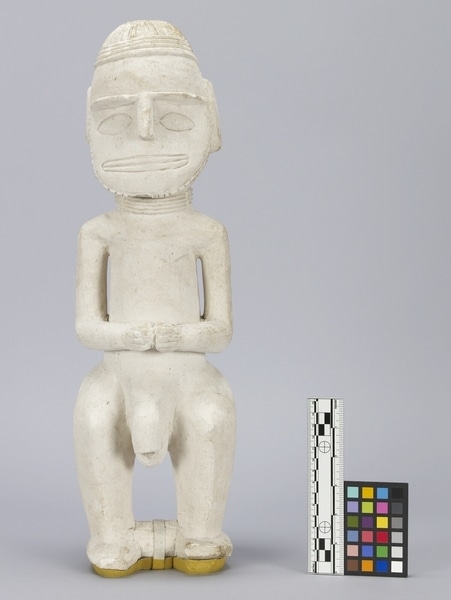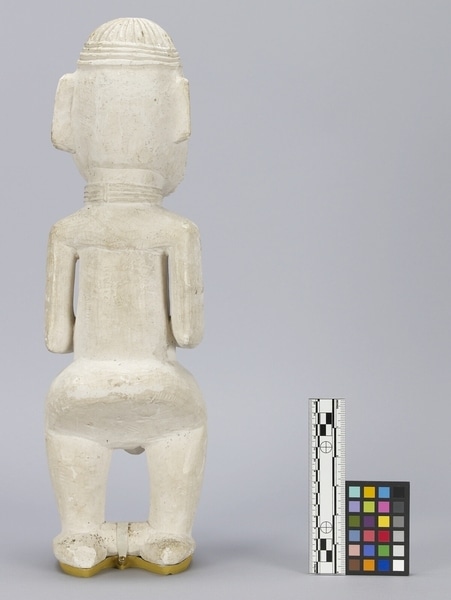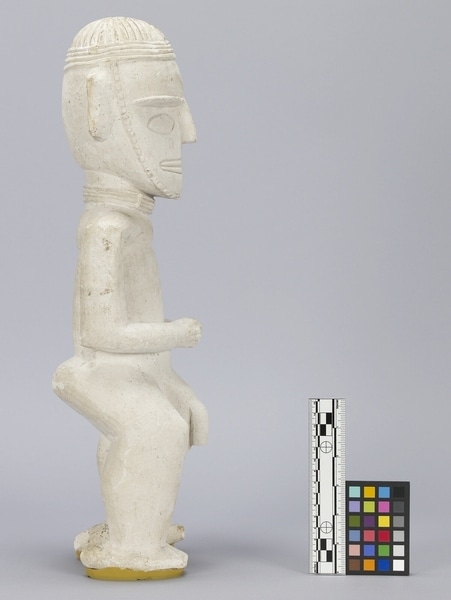Ancestor Figure Item Number: C381 from the MOA: University of British Columbia




Description
Figure representing a full length nude male wearing a hat and a necklace. The hat is rounded around the head with vertical radiating grooves along the sides surrounded by horizontal grooved lines around the rim. High forehead creating protruding eyebrows. A rectangular nose. Ovoid eyes. Has horizontal slits creating upraised lips which are surrounded by a grooved oval line. Notched effect around the sides of the face and the chin. The necklace consists of four rings attached together with vertical pieces. From the square shoulders, the thin arms are straight at the sides until they are bent at the elbows so that the hands are touching each other at the front. Has genitalia, rounded buttocks, legs with high-pointed knees, and stubby feet. Has a metal base.
History Of Use
Ancestor figures, or kulap, served as a representation of recently deceased people. A kulap held the spirit of the deceased so that he or she would not wander aimlessly and perhaps cause harm to the living. It was kept in a shrine, where it remained until funerary rites conducted by men were completed. Women were not allowed access to the shrine; they had to stay outside the enclosure to mourn their lost relative. When the funerary rituals were complete and the spirit of the deceased had departed, the kulap were destroyed. During the colonial period, kulap were sold to Westerners. In the words of the donor, the use of kulap figures was as follows: “on the death of any member of a Chief's family one of the men ... goes to the bush tribe that live in the Rossel Mountains and obtains a chalk figure of either a man or a woman, according to the sex of the deceased, with which he returns to his village and with great secrecy gives it to a Chief ... by whom it is then placed in a Toberran House or Mortuary Chapel. If this is not done the spirit of the departed, being without a habitation on this earth, will haunt the survivors of its late family and inflict upon them some evil. Women are never allowed to go near or look upon these figures, it being death for them to do so."
Specific Techniques
Kulap were commissioned from specialist carvers in the Rossel Mountains of New Ireland. According to the donor, Frank Burnett, the chalk the figure is made of is found at the summit of the Rossel Mountains, it is the sole deposit of that material found in the South Pacific.
Item History
- Made in New Ireland, Papua New Guinea between 1900 and 1927
- Collected between 1895 and 1927
- Owned by Frank Burnett before 1927
- Received from Frank Burnett (Donor) on July 25, 1927
What
- Name
- Ancestor Figure
- Identification Number
- C381
- Type of Item
- figure
- Material
- chalk stone
- Manufacturing Technique
- carved
- Overall
- height 47.5 cm, width 14.4 cm, depth 13.7 cm
Who
- Culture
- Western Melanesia
- Previous Owner
- Frank Burnett
- Received from
- Frank Burnett (Donor)
Where
- Holding Institution
- MOA: University of British Columbia
- Made in
- New Ireland, Papua New Guinea
When
- Creation Date
- between 1900 and 1927
- Collection Date
- between 1895 and 1927
- Ownership Date
- before 1927
- Acquisition Date
- on July 25, 1927
Other
- Item Classes
- carvings & sculpture
- Condition
- fair
- Current Location
- Case 66
- Accession Number
- 2191/0767